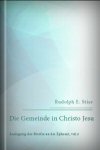Classic Commentaries and Studies on Ephesians Upgrade (14 vols.)
Digital Logos Edition
Overview
The 14-volume Classic Commentaries and Studies on Ephesians Upgrade provides even more valuable resources for studying Paul’s letters to the Ephesians. The critical interpretations, observations, discussions of thematic elements, and practical applications found in this collection are only available together in this special upgrade to Classic Commentaries and Studies on Ephesians (23 vols.). This collection of nineteenth- and twentieth-century scholarship is invaluable for students, scholars, pastors, historians, teachers of the Bible, or anyone studying Ephesians.
In Logos, these foundational volumes are enhanced by cutting-edge research tools. Scripture citations link directly to English translations, and important terms link to dictionaries, encyclopedias, and a wealth of other resources in your digital library. Powerful searches help you find exactly what you’re looking for. Tablet and mobile apps let you take the discussion with you. With Logos Bible Software, the most efficient and comprehensive research tools are in one place, so you get the most out of your study.
Want more classic works on Ephesians? Check out the 23-volume Classic Commentaries and Studies on Ephesians, available now.

- Includes 11 English-language and three German-language studies of Ephesians
- Presents a wide variety of perspectives and approaches to Scripture
- Features accessible and academic texts
- Title: Classic Commentaries and Studies on Ephesians Upgrade
- Volumes: 14
- Pages: 3,569
- Brief Notes on the Epistle to the Ephesians: The Church at Thessalonica by J. G. Bellett
- Browsings in Ephesians by Frederick C. Grant
- Ephesians: The Three-Fold Epistle by William B. Riley
- God in Christ Jesus: A Study of St. Paul’s Epistle to the Ephesians by J. Scott Lidgett
- In the Heavenlies—Ephesians I.3: A Sermon by Archibald G. Brown
- Lectures on the Epistle of Paul, the Apostle, to the Ephesians, With a New Translation by William Kelly
- Paul’s Epistle to the Ephesians by Robert S. Candlish
- St Paul’s Epistle to the Ephesians: A Devotional Commentary by Charles Brown
- The Beautiful Word Pictures of the Epistle to the Ephesians: Or, The Busy Man’s Commentary upon the Bible by W. A. Haynes
- The Glory of the Body of Christ: An Opening up of the Epistle to the Ephesians by E. F. Stroter
- Three Lectures on the Epistle to the Ephesians by H. L. Goudge
- Erklärung Des Briefes Pauli An Die Epheser by Johann Tobias Beck and Julius Lindenmeyer
- Die Gemeinde in Christo: Auslegung des Briefes an die Epheser, vol. 1 by Ewald Rudolf Stier
- Die Gemeinde in Christo: Auslegung des Briefes an die Epheser, vol. 2 by Ewald Rudolf Stier
This title is included in the following collections
You can save when you purchase this product as part of a collection.
Logos 8 Collector's Edition Le...
$11,399.99$11,399.99Logos 9 Collector's Edition Le...
$11,399.99$11,399.99Logos 8 Ultimate Legacy Librar...
$21,749.99$21,749.99Logos 9 Ultimate Legacy Librar...
$24,999.99$24,999.99
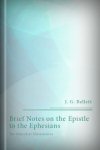
This volume contains J. G. Bellett’s commentary on Ephesians. Written in accessible language, Bellett shares his meditations on the epistle, providing both exegesis and context.
J. G. Bellett (1795–1864) was an Irish Christian writer and theologian. His works include The Patriachs, The Evangelists, and Short Meditations on Elisha.
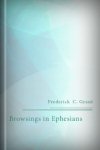
In this volume, Frederick C. Grant provides verse-by-verse analysis of Ephesians. Grant considers the context of the letter, the translation of the original-language text, and the perspectives of other theologians.
Frederick C. Grant (1891–1974) was Edwin Robinson Professor Emeritus of Biblical Theology at Union Theological Seminary, New York, and president of Seabury-Western Theological Seminary, Evanston, Illinois. He is also the author of Hellenistic Religions: The Age of Syncretism, An introduction to New Testament Thought, and Basic Christian Beliefs.

In this volume, William B. Riley argues that Ephesians was written in an arrangement of triplets and that this feature is intentional, lending itself to scholarly analysis.
- Foreward
- Chapter One—“The Three Authors of Salvation”
- Chapter Two—“The Three Subjects of Salvation”
- Chapter Three—“The Three-Fold Effect on Paul”
- Chapter Four—“The Three-Fold Appeal to the Church”
- Chapter Five—“The Three Features of the Believer’s Walk”
- Chapter Six—“The Three-Fold Appeal to the Family”
- Chapter Seven—“The Three-Fold Expression of Spiritual Life”
William B. Riley (1861–1947) founded the Northwestern Bible Training School, and served as pastor of the First Baptist Church of Minneapolis, Minnesota, for over 40 years. He was the editor of The Christian Fundamentalist from 1891 to 1933, and his works include The Menace of Modernism, Revival Sermons: Essentials in Effective Evangelism, and The Evolution of the Kingdom.

In this volume, written for Bible students, J. Scott Lidgett provides an expository treatment of Ephesians, presenting is as an expatiation on the subject of God in Christ Jesus.
J. Scott Lidgett (1854–1953) earned his MA in 1875 from University College, London, and was awarded a DD by the University of Aberdeen in 1902. He was president of the Wesleyan Methodist Conference in 1908 and was an early supporter of the ecumenical movement. His works include The Fatherhood of God, God in Christ Jesus, and The Spiritual Principle of the Atonement.
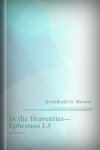
In this sermon, Archibald G. Brown analyzes Ephesians’ reoccurring references to the “heavenlies” or “high places.” Brown writes that the “heavenly realm, and the blessed work of this epistle is to show the position of God’s saints in the kingdom.”
Archibald G. Brown (1844–1922) was a Calvinistic Baptist minister; a student, friend, and associate of Charles Spurgeon; and from 1908 to 1911, pastor of the Metropolitan Tabernacle in London. His works include The Devil’s Mission of Amusement and The Face of Jesus Christ: Sermons on the Person and Work of Christ.
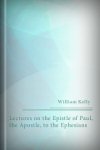
This volume contains William Kelly’s chapter-by-chapter lectures on Ephesians. Prior to Kelly’s analysis of key verses, the work presents the entire text of Ephesians.
William Kelly (1823–1906) was educated at Trinity College in Dublin. He was involved with the Plymouth Brethren, and he served as editor for The Collected Writings of John Nelson Darby. His other work includes The Second Advent of Christ Premillennial: A Reply to the Rev. D. Brown.
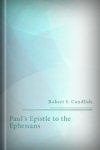
This volume presents Robert S. Candlish’s series of lectures on Paul’s Epistle to the Ephesians. Candlish wrote and delivered these lectures from 1863 to 1869.
Robert S. Candlish (1806–1873), a Scottish pastor, became a principal figure in establishing the Free Church of Scotland in 1843. A prolific author, prominent professor, and popular preacher, he was stationed as the distinguished principal of New College, Edinburgh in 1862.

In this text, Charles Brown presents readers with Paul’s purpose in writing Ephesians. Brown designed this work for devotional reading, and he encourages readers to deepen their studies of Scripture, noting that “in the Lord Jesus . . . are hid all the treasures of wisdom and knowledge.”
Charles Brown is also the author of The General Epistle of James: A Devotional Commentary.

Written for lay people, this verse-by-verse commentary is the culmination of more than 20 years of Wilson Albinus Haynes’ study of Ephesians. Haynes compares and contrasts this letter with Paul’s other letters and also explores the word choice in the original-language text.
W. A. Haynes (1873–1913) is the author of The Beautiful Word Pictures of the Epistle to the Ephesians: Or, The Busy Man’s Commentary upon the Bible.
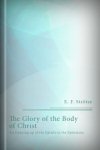
This volume is E. F. Stroter’s English translation of his German-language Die Herrlichkeit des Leibes Christi. It is a verse-by-verse commentary of Ephesians. Stroter also discusses key themes.
E. F. Stroter (1846–1922) was a German Methodist theologian. His other works include The Gospel of God’s Reconciliation of All in Christ and Das Evangelium Gottes von der Allversöhnung in Christus.
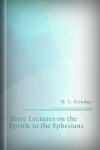
In this volume, H. L. Goudge shares three lectures about Ephesians. In the first lecture, he interprets Ephesians through an analysis of Paul’s convictions. In the second lecture, Goudge explores Paul’s conception of Christ and the Christian life. In the third lecture, Goudge discusses the epistle’s teachings on sin and spiritual adversaries.
H. L. Goudge served as Regius Professor of Divinity at Oxford from 1923 until 1938.
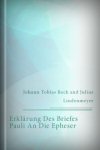
Johann Tobias Beck is known for his perspective of the Bible as the history of the Spirit’s progression toward humankind’s salvation. This German-language volume provides Beck’s exegesis on Ephesians. This work is representative of Beck’s doctrinal perspectives.
Johann Tobias Beck (1804–1878) was a German theologian. Beck graduated from the University of Tübingen in 1826. From 1836 to 1843, he was professor of theology at the University of Basel. In 1843, he accepted the same position at the University of Tübingen.
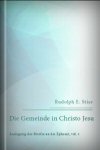
Ewald Rudolf Stier is recognized for his poetic prose and detail-oriented exegesis. In this German-language volume, Stier applies his skilled analysis to Ephesians.
Ewald Rudolf Stier (1800–1862) entered the University of Berlin to study law, but abandoned the pursuit for his love of poetry. As a consequence of the unexpected death of a young woman he loved, his focus turned to theology and he entered the pastoral seminary in Wittenberg where he devoted himself to a comprehensive study of the Bible. Stier was a pastor at Frankenleben from 1829 to 1838 and at Wichlinghausen from 1838 to 1847. In 1850, he was called to the office of superintendent at Schkeuditz, then was superintendent at Eisleben from 1859 until his death. He was the author and translator of numerous books and commentaries, but is chiefly known for his devotional and mystical commentaries, The Words of the Lord Jesus.
Reviews
1 rating

Debra W Bouey
3/9/2016

Andrew
2/13/2016
Finally got around to checking out some of my "Community Pricing" hmm, I did not know this would have three books in a foreign language, guess I better read closely before I hid the bid button...Kinda feel cheated, but hey 11 out 14 are in English and for what $18, it's Cool...This Time :-)Hayedid
12/12/2014
Jaime, I totally agree. I think it's put in there to sell it as a 14-volume set... which for most people will actually be an 11-volume set. I too am disappointed with the direction I see Logos going. They seem to be willing to peddle any book they can get their hands on... Mormonism, Jehovah's Witness, American History, Plato, German.... Some are okay (Amer. History) if you want them. Others, I strongly believe, are inappropriate. Marc... OF COURSE you are paying for the book. Seems it would be good if they included a math and economics book in the set as well! ;) These community priced books are funded by us as a community. Sure, some of them may be at a good price, but I would much prefer English books. Sure.... some people enjoy foreign languages... you missed the point... mixing English and German in one set makes those who don't know German pay for books they can't read.
REV. DR. JAIME LOPEZ ORTEGA
7/9/2014
why the German writings.. If I could read it I would opt for it surely, but this product I presume is sold mainly to English reading clients.. I can't help but feel that I should get something else in it's place since I should not be paying for something that I c annot use and that came in to the bundle as a rider document.. A bad way to to do business I believe..Please change that habit Logos.. It does not look good for you or us who pay for what we need and want..Thank you, Rev. Jaime Lopez Ortega New Bedford Ma.
